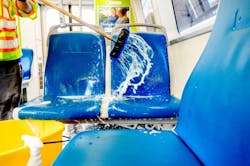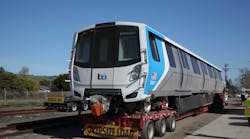BART launches Safe & Clean Plan
Bay Area Rapid Transit (BART) has launched its new Safe & Clean Plan to ensure riders feel safe and experience clean and healthy service from departure to destination.
BART riders have seen a stronger police presence on trains to prevent incidents and encourage safer riding practice. The stronger police presence has brought the average response time to incident reports and emergencies down to four minutes. Increased patrols are yielding results by deterring crime and quickly apprehending perpetrators when incidents occur. The agency says it has seen an 85 percent drop in cellphone snatches since 2019.
BART's policing approach uses unarmed Crisis Intervention Specialists, Ambassadors and Fare Inspectors for additional patrols with experts in de-escalation. BART says seven percent of calls have been diverted from police to an employee with training in social work. BART is also expanding recruiting outreach sources for all vacant officer positions and adding 19 additional officer positions once vacancies are filled.
Another aspect of the safety plan is to eliminate near-empty train cars by shortening the least-crowded trains and maintaining 4,000-plus surveillance cameras to minimize response time and hold suspects accountable. LED lighting was also installed on platforms and in parking facilities to eliminate dark corners.
A major part of this program was increasing transparency and community outreach to proactively address transit safety concerns.
Commitment to new fare gates
To effectively secure BART stations, taller, stronger fare gates will be installed to deter fare evasion. A pilot of the fare gates will be installed at West Oakland by the end of 2023 to test effectiveness of the design. This will be followed up with a complete installation of 700-plus new fare gates systemwide by the end of 2025 and with the addition of elevator fare gates.
Commitment to a clean ride
As a part of the safety portion of the plan, BART will be doubling the rate of deep cleaning on train cars and retiring all older trains. BART will also be adding nearly 66 percent more in dedicated crew members to keep stations clean throughout the workday. High-volume station restrooms will be staffed with attendants to maintain cleanliness and safety throughout the day.
Commitment to adapt service and attract new riders
BART is making changes to September 2023's schedule to bring train deployment up to date by increasing emphasis on ridership growth opportunities and relying less on outdated commuting models. There will also be a 50 percent increase in daily evening service to make public transit more accessible to the community.
This plan will help eliminate 30-minute wait times on weekends and nights and reduce platform wait times with the new scheduled transfers. Service on BART’s busiest weekday line, the Yellow Line, has increased trains from every 15 minutes to every 10 minutes from Pittsburg/Bay Point to get drivers off congested highways 4, 680 and 24. The new schedule will help to improve reliability and better serve SFO and OAK. Customers' on-time performance has improved to 91 percent and timed transfers have improved to 80 percent, making canceled trips a rarity.
This plan will also increase the Clipper START fare discount for low-income riders to 50 percent on Jan. 1, 2024 and offer Clipper BayPass, where employers purchase all-you-can-ride transit passes for employees.






